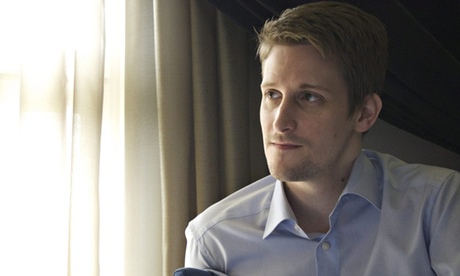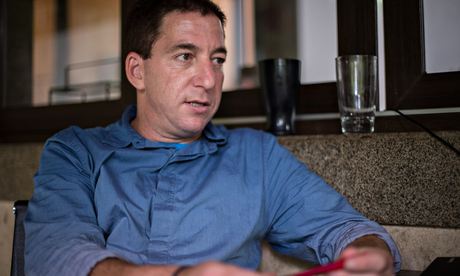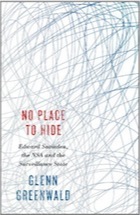‘No Place to Hide’ by Glenn Greenwald, on the NSA’s sweeping efforts to ‘Know it All’ – The Washington Post
By David Cole, Tuesday, May 13, 2:46 AM
At a meeting with his British counterparts in 2008, Keith Alexander, then head of the National Security Agency, reportedly asked, “Why can’t we collect all the signals, all the time?” The NSA has since sought to dismiss that remark as a quip taken out of context. In his new book, “No Place to Hide,” Glenn Greenwald, one of three recipients of the voluminous, top-secret material that NSA contractor EdwardSnowden chose to leak, uses those documents to prove that thiswas indeed the agency’s guiding principle.In one remarkable slide presented at a 2011 meeting of five nations’ intelligence agencies and revealed here for the first time, the NSA described its “collection posture” as “Collect it All,” “Process it All,” “Exploit it All,” “Partner it All,” “Sniff it All” and, ultimately, “Know it All.”
Much has been written about the NSA’s omnivorous appetite for personal data — much of it by Greenwald for the Guardian and other outlets. In his new book, however, he offers a revealing and disturbing overview, illustrated by dozens of reproduced secret documents, of just how far the NSA has gone to achieve Alexander’s vision of collecting and knowing it all. Relying on newly disclosed and already disclosed documents, Greenwald shows that the scope of the NSA’s surveillance not only exceeds our imagination but the agency’s capacity even to store, much less analyze, it all.
In a one-month period last year, for example, a single unit of the NSA, the Global Access Operations unit, collected data on more than 97 billion e-mails and 124 billion phone calls from around the world; more than 3 billion of those calls and e-mails were collected as they passed through the United States. As of 2012, the agency was processing more than 20 billion telecommunications per day. In a single month in 2011, the NSA collected 71 million calls and e-mails from Poland alone — not a major hub of terrorist activity, the last I checked. The NSA has admitted that “it collects far more content than is routinely useful to analysts.” These numbers call to mind Sen. Everett Dirksen’s quip about government spending: “A billion here, a billion there, and pretty soon you’re talking about real money.”
The NSA achieves these ends by working hand in hand with private telecommunications and Internet service providers. One NSA document describes an unnamed corporate partner as “aggressively involved in shaping traffic to run signals of interest past our monitors” and reports that in a single month, this top-secret, public-private partnership yielded more than 6 billion records of telephone calls and Internet activity. Under another program revealed here, the NSA intercepts routers, servers and other network equipment being shipped overseas; installs back-door surveillance bugs; rewraps the packages with factory seals; and sends them on their way, thereby ensuring that the agency will have clandestine access to all information that passes through them.
Other documents describe X-KEYSCORE, the NSA’s most powerful tool, which, as its name implies, enables the agency to track every keystroke on a computer, permitting the agency to monitor in real time all of a user’s e-mail, social-media and Web-browsing activity. In a single month in 2012, X-KEYSCORE collected 41 billion records for one NSA unit. Greenwald contends that this is the program Snowden was referring to when he said that, with an e-mail address, he could tap into any American’s communications. (The NSA has accused Snowden of exaggerating, but the documents suggest that he may be right.)
Some of Greenwald’s most disturbing disclosures concern not the NSA but its British counterpart, the Government Communications Headquarters (GCHQ). His documents reveal that the GCHQ engages in “online covert action” against loosely defined “hacktivists” designed to disrupt, degrade and discredit their online presence. Taking a page from COINTELPRO, the FBI’s 1960s campaign against U.S. radicals, the GCHQ’s tactics include luring targets to sexually compromising Web sites, posting false blogs and launching other “info ops to damage reputations.”
Other revelations are less surprising, although Greenwald tends to deliver them as if they were all equally scandalous. He reports, for example, that the NSA cooperates with other countries’ spy agencies, even as they spy on us and we on them. Is anyone other than Greenwald “shocked, shocked” by this news? He notes that the NSA collects data not only for counterterrorism purposes but for economic and diplomatic advantage. Again, did anyone think otherwise? Since 1978, the Foreign Intelligence Surveillance Act has expressly authorized the collection of “foreign intelligence information,” defined to include any information about a foreign power or territory that “relates to . . . the conduct of the foreign affairs of the United States.” Surely oil supplies and trade negotiations are as relevant to our foreign affairs as terrorism is. And it hardly follows that, as Greenwald claims, “stopping terror is clearly a pretext” for the NSA.
Some disclosures raise more questions about Greenwald’s judgment than about the NSA’s activities. One document, for example, identifies the specific methods used to bug 24 named foreign embassies. The document reveals top-secret methods and targets, and its disclosure is likely to undermine legitimate intelligence-gathering and cause serious diplomatic problems. Yet it is difficult to see what possible value it adds to the public debate. It is one thing to disclose secret government practices that raise serious moral, political and constitutional concerns — as many of Snowden’s disclosures have done. But bugging foreign embassies is at the core of foreign intelligence, and there is nothing illegal or particularly surprising about the fact that we do it.
Greenwald does not always recognize the difference between justified and unjustified disclosures. And that’s too bad, as Snowden placed his trust in Greenwald to make such calls.
Greenwald’s descriptions of NSA programs can also be misleading. He never mentions, for example, that there are significant “back-end” limits on how the agency can search and use much of the data it collects. These limitations constitute the core of the NSA’s defenses of its programs. While I don’t find those defenses entirely convincing, a serious effort to grapple with the issue would not simply ignore them.
The force of Greenwald’s argument is sometimes undermined by his hyperbolic style and more-radical-than-thou attitude. He depicts the NSA, for example, as part of a grand scheme by elites to control the masses, of a piece with what he sees as “the response to the Occupy movement . . . to crush it with force, through tear gas, pepper spray, and prosecution.” Really? Maybe I’m imagining things, but I recall seeing Occupy demonstrations for months on end throughout the country, including in the nation’s capital.
And he asserts that “both the United States and the United Kingdom have made clear that there are no limits — ethical, legal, or political — that they will observe when they claim to be acting in the name of ‘terrorism.’ ” Has he read the substantial debates in Britain over preventive detention, control orders, complicity in torture and the like? Has he seen the Obama administration’s brief to the U.S. Court of Appeals for the D.C. Circuit insisting that the laws of war must limit detention authority at Guantanamo and urging the court to reverse a statement to the contrary? Or President Obama’s orders barring the use of enhanced interrogation techniques? Such overstatement weakens Greenwald’s credibility, which is unfortunate, because much of what he has to say is extremely valuable.
Part of the problem is that Greenwald sees the world in black and white. As he puts it, “There are, broadly speaking, two choices: obedience to institutional authority or radical dissent from it.” For him there is apparently nothing in between. Anyone who does not share his radical dissent is, therefore, a tool for the political elite. When the New Yorker’s Hendrik Hertzberg and The Washington Post’s Ruth Marcus question the significance of metadata collection, Greenwald concludes that “journalists who devote their careers to venerating the country’s most powerful official — the president . . . and defending his political party rarely, if ever, risk alienating those in power.” I, too, think Hertzberg and Marcus fail to adequately appreciate the dangers of metadata collection, but one need only read a random sample of their hard-hitting columns to see that they are hardly averse to alienating those in power.
Similarly, Greenwald blasts the “establishment media” for consulting with the government about disclosing secret information and accuses them of wanting only to make the government look good. But then how does one explain the disclosures of the Pentagon Papers, Watergate, Abu Ghraib, the CIA’s black sites and torture program, renditions to torture, the NSA’s warrantless wiretapping, the New York Police Department’s spying on Muslims and the drone program? Most of what we know about the government’s most troubling national security measures comes from what Greenwald dismisses as “the establishment media.”
This is an important and illuminating book. It would have been more important and illuminating were Greenwald able to acknowledge that the choices we face about regulating surveillance in the modern age are difficult and that there are no simple answers. (He notably suggests virtually nothing in the way of positive reforms, sticking instead to criticism.)
Snowden handed Greenwald the story of a lifetime. NSA coverage based on the leaked material resulted in The Washington Post and the Guardian winning Pulitzer Prizes for public service this year. Greenwald has done the world a service by helping to explain the significance of the disclosures for everyone’s privacy. He has helped spark a much-needed national and worldwide debate about how to preserve privacy when we do so much online, and when the NSA and others have the technological means to track virtually all we do there. But his book would have been more persuasive had he confronted what is difficult about the issue and not simply been satisfied with lobbing grenades at all who are less radical than he is.
Cole is the Hon. George Mitchell professor in law and public policy at Georgetown University Law Center and is the legal affairs correspondent for the Nation.







